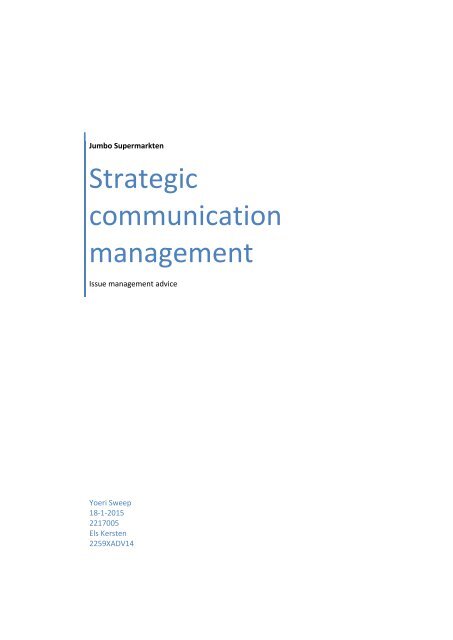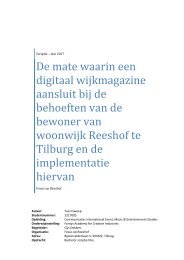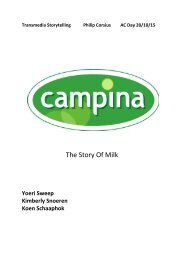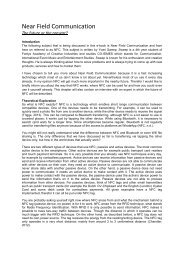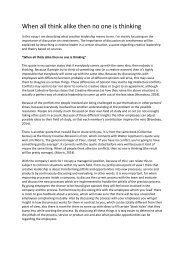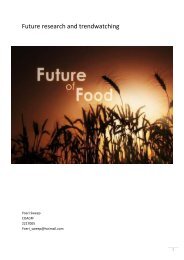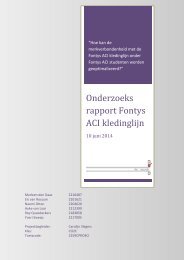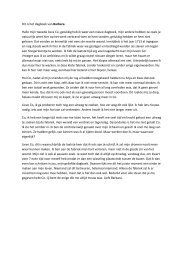Strategic Communication Management
Create successful ePaper yourself
Turn your PDF publications into a flip-book with our unique Google optimized e-Paper software.
Jumbo Supermarkten<br />
<strong>Strategic</strong><br />
communication<br />
management<br />
Issue management advice<br />
Yoeri Sweep<br />
18-1-2015<br />
2217005<br />
Els Kersten<br />
2259XADV14
Introduction<br />
In this strategic communication advice three issues regarding the Supermarket-industry will<br />
be pointed out for Jumbo Supermarkten. These issues will be further elaborated in this<br />
document. After elaborating these issues an issue management communication advice will<br />
arise from it.<br />
The chosen issue(s) will be worked out more detailed, including a stakeholder analysis using<br />
the stakeholder mapping tool. An internal analysis of the company will give insight in the<br />
company. The strategic choices will be based on the core values of the company.<br />
The goal of this advice is to inform and advice the chosen company about an existing issue<br />
which can possibly cause a crisis for the company. The advice will include the company’s<br />
chosen strategy regarding the position to the issue, communication decisions and a<br />
conceptual campaign.<br />
Yoeri Sweep 2217005 Pagina 1
Table of contents<br />
Chapter 1. Jumbo Supermarkten .......................................................................................... 3<br />
Chapter 2. Three issue analyses ............................................................................................ 4<br />
1.1 Issue 1; Over Packaging ........................................................................................................... 4<br />
1.2 Issue 2; Food Waste ................................................................................................................ 6<br />
1.3 Issue 3; Living Conditions Animals........................................................................................... 8<br />
Chapter 3. Chosen Issue ...................................................................................................... 10<br />
Chapter 4. Stakeholder Analyses ........................................................................................ 12<br />
4.1 Involved Stakeholders; Over Packaging................................................................................ 12<br />
4.1.1 Stakeholder 1; Customers ............................................................................................. 14<br />
4.1.2 Stakeholder 2; Activist organizations ........................................................................... 14<br />
4.1.3 Stakeholder 3; Producers ............................................................................................. 14<br />
4.1.4 Stakeholder 4; Media ................................................................................................... 15<br />
4.1.5 Stakeholder 5; Competition.......................................................................................... 15<br />
4.1.6 Stakeholder 6; Legislative provisions / Government .................................................... 16<br />
4.1.7 Table stakeholders ........................................................................................................ 16<br />
4.2 Involved Stakeholders; Food Waste ..................................................................................... 17<br />
4.2.1 Stakeholder 1; Customers ............................................................................................. 18<br />
4.2.2 Stakeholder 2; Activist organizations ........................................................................... 19<br />
4.2.3 Stakeholder 3; Producers ............................................................................................. 19<br />
4.2.4 Stakeholder 4; Media ................................................................................................... 19<br />
4.2.5 Stakeholder 5; Competition.......................................................................................... 20<br />
4.2.6 Stakeholder 6; Legislative provisions / Government .................................................... 20<br />
4.2.7 Table stakeholders ........................................................................................................ 20<br />
Chapter 5. Issue management ............................................................................................ 21<br />
5.1 What if it turns into a crisis ................................................................................................... 21<br />
5.2 Claiming issues ...................................................................................................................... 21<br />
Chapter 6. Goal .................................................................................................................... 22<br />
Chapter 7. Operational ........................................................................................................ 22<br />
Chapter 8. <strong>Strategic</strong> ............................................................................................................. 24<br />
8.1 The cooperative strategy ....................................................................................................... 24<br />
8.2 Message ................................................................................................................................ 25<br />
Chapter 9. Timeline ............................................................................................................. 26<br />
Chapter 10. Sources .............................................................................................................. 27<br />
Chapter 11. Attachments ...................................................................................................... 30<br />
11.1 Evaluation on crisis day ........................................................................................................ 30<br />
11.2 Reflection on crisis day ......................................................................................................... 30<br />
Yoeri Sweep 2217005 Pagina 2
Chapter 1.<br />
Jumbo Supermarkten<br />
I have chosen Jumbo Supermarkten as the company for which I am going to write a strategic<br />
issue management document.<br />
Jumbo Supermarkten is a family business and already exists for more than 90 years. The<br />
unique formula of the lowest guaranteed price, the widest assortment and the best service,<br />
daily contribute to the success of Jumbo. Since the acquisition of Super de Boer (2009) and<br />
C1000 (2012) Jumbo Supermarkten is the second biggest supermarket chain of The<br />
Netherlands. In total every week approximately 3 million customers shop at Jumbo<br />
Supermarkten.<br />
Furthermore Jumbo Supermarkten has the image (and wants to have the image) to be for<br />
‘the normal citizen’. This can be seen by, for example, their type of commercials. In their<br />
latest commercials they use the same ‘normal family’ that’s lying on the couch, having some<br />
irritations and doing groceries. The commercials vary in content but not in feel. Also Jumbo<br />
Supermarkten has had commercials with Lotto NL – Jumbo (which they sponsor) and Joop<br />
Zoetemelk in it, who remained to be a very normal person even though he has won the Tour<br />
de France. In this commercial their motto was: ‘In everyone lies a champion’ (Jumbo<br />
Supermarkten, 2015). These commercials prove that Jumbo is trying to (and probably has,<br />
due to their family history company) have the image of being normal.<br />
7 certainties<br />
In 1996 Jumbo introduced a unique formula called the 7 certainties which was based on the<br />
lowest prices, the widest assortment and the best service. This came out of a research about<br />
the biggest annoyances of shopping customers. The transition to a formula in which the<br />
customer is central proved to be a big success. Since the introduction Jumbo kept on<br />
growing harder and bigger.<br />
Mission<br />
‘Go further where others stop’<br />
Jumbo wants to exceed expectations, every day, everywhere and for every customer. Based<br />
on the conviction that it can always be better, cheaper and different, Jumbo has the drive to<br />
make the impossible possible by continuing where others stop. Jumbo states that they want<br />
to be successful in every market segment in which they operate due to their winning<br />
mentality and continuous focus on the customer.<br />
The customer is central<br />
Customer focus is the common thread in the way of working of Jumbo. In everything they do<br />
the customer comes first. That is also the basis of their unique formula. Jumbo states that<br />
not only the customer benefits from this: ‘For the staff it’s also nice and fun to work this<br />
way.’ For a good implementation of working this way by the staff, the 7 certainties are an<br />
important tool.<br />
The unique Jumbo formula<br />
Best service + widest assortment x lowest price = The unique Jumbo formula (Jumbo, 2015).<br />
Yoeri Sweep 2217005 Pagina 3
Chapter 2.<br />
Three issue analyses<br />
Underneath three issues regarding the supermarket industry will be described briefly using<br />
the Issue checklist (Coombs, 2012) (Ferdinand & Korver, 2010).<br />
1.1 Issue 1; Over Packaging<br />
Over packaging concerns a few things. One of these is that a lot of products have packages<br />
which they don’t even need. Also a lot of products are in packages that are much bigger than<br />
the actual product and are most definitely not necessary. Furthermore there is criticism<br />
about the fact that every product has its own package while customers keep throwing these<br />
packages away while it is also possible to (re)fill your own packages. Moreover people are<br />
not able to buy the amount of ingredients that they actually like and have to buy a bulk<br />
package; this connects to the Food Waste issue.<br />
Is it an openly debated problem in society?<br />
Over Packaging is an openly debated problem in society. Lately people are showing more<br />
care about the environmental state of the earth and about following a healthy lifestyle. Not<br />
only by eating more healthy but also by making sure that the choices they make and the way<br />
of handling things is good for the environment and don’t affect the environment in a bad<br />
way. Also green marketing is becoming more important in the decision making process<br />
(Global Industry Analysts, 2012).<br />
There are already some new supermarkets that are only selling products without packages<br />
like in Berlin and Antwerp (Borromeo, 2014). Most of them are built by using the<br />
crowdfunding method. That means that there are a lot of people interested in products in<br />
supermarkets without, or with less, packages.<br />
Also lately a lot of new inventive packages have been introduced to the market, such as<br />
smart packages (Dainelli, Gontard, Spyropoulos, Zondervan-van den Beuken, & Tobback,<br />
2008). This means that the industry already feels that something has got to change, because<br />
apparently they are losing, or able to lose, a lot of customers by going on with the packaging<br />
policy being used now.<br />
The main question is: Who is responsible for the reduction of packages? Some people say<br />
it’s in the hands of the customers. If they don’t buy the products anymore the shops won’t<br />
sell it and the producers will start thinking about producing it differently. However, often the<br />
customers have no choice because there is no alternative, on the other hand, the producers<br />
can manage the issue before it influences the company’s image. Furthermore the shops can<br />
stop selling it to make a statement to the producers to lower on packaging. However, this<br />
could have a negative impact on the business relationship between the shop and the<br />
producer. The shops would also have to find an alternative product with less packaging,<br />
which could lead to higher costs.<br />
Yoeri Sweep 2217005 Pagina 4
Is there growing media attention for the problem overtime?<br />
If you search for over packaging products on Google you get a lot of results regarding<br />
journalistic websites that state that there are many products which are being over packaged.<br />
Searching for over packaging also leads to a lot of results which state that new supermarkets<br />
have opened (or are being crowdfunded) which only sell products without packages<br />
("Nederland krijgt eerste verpakkingsvrije supermarkt", 2014).<br />
Furthermore there are some activists who want to prove the world how much you actually<br />
buy when you buy a shopping cart full of groceries and how many space is taken in by just<br />
the packages. The issue is already active for a long time, but seems to be catching more<br />
lately (more package-free supermarkets are opening doors). Already in 2008 Dutch television<br />
program Kassa sent a reporter to go strip-shopping in Dutch supermarket Albert Heijn to<br />
show how many packages are used for a small amount of products (Vara, 2008).<br />
Is there a conflict?<br />
There is a conflict between environmental organizations and shops that sell tangible<br />
products. Also there is a raising conflict between customers and the shops, because<br />
sustainability is getting more and more important due to different campaigns. People are<br />
feeling more responsible to care for the environment. People want their food to be<br />
consumable for a longer time (why it needs to be packed) but on the other hand they want<br />
more sustainable packages or less packages because it is not good for the environment.<br />
Is the problem ready for resolution?<br />
It’s hard to say if over packaging is actually ready for resolution. It’s definitely ready for<br />
change, although some changes will be hard to achieve. That’s because a lot of food is<br />
packed in a way so that it can be preserved for a longer time. Hence it is possible to sell<br />
these products without a package, but people may not want to adapt to buying these<br />
products freshly every few days. Because of that the issue would be partly solvable, by<br />
providing smaller packages or products without packages if possible, because a lot of articles<br />
are packaged in way bigger packages than needed.<br />
Would the solution involve policy decisions?<br />
The solution will definitely involve policy decisions; the supermarket will have to negotiate<br />
with suppliers and producers about minimalizing packages and about ordering products<br />
without packages. For example oil and wine in crates, so that the customer can bring their<br />
own bottles to fill.<br />
Also the supermarket will need a different prize scaling for the products without packages<br />
and the supermarket will need some new ‘rules’ in their terms and conditions for their<br />
customers.<br />
It is possible that the government will take measures in this case to like for example raise<br />
taxes on packaging or forbid certain non-biodegradable packages.<br />
Yoeri Sweep 2217005 Pagina 5
1.2 Issue 2; Food Waste<br />
Food Waste is currently an issue because there is way too much food being wasted, while at<br />
the same time there are a lot of people in the world that are dealing with food shortage. The<br />
food is not only wasted by consumers but also by stores and production companies.<br />
Is it an openly debated problem in society?<br />
It is most definitely an openly debated problem in society. The importance of sustainability is<br />
increasing fast over the last years. Food waste is an important factor in sustainability.<br />
Food Waste is a bit similar to the ‘Over Packaging issue’; it may overlap each other in some<br />
ways. Because over packaging isn’t only about using too much packaging material for a<br />
product but is also about having to buy more than people need, because it’s not possible to<br />
buy the amount of something as you would like. Which causes that the product will expire<br />
and will eventually be thrown away ("#lastpak: weg met te grote verpakkingen", 2015).<br />
A lot of food already goes to waste in the farming process. The foods that don’t fit ‘the<br />
normal’ subscription are most likely thrown away. In some cases these products are already<br />
used for (for example) sauces and soups. Also a lot of food is wasted at supermarkets and<br />
households (Schripsema, Van der Burgh, Van der Sluis & Bos-Brouwers, 2015).<br />
Furthermore the European Commission is aiming at reducing food waste with fifty percent<br />
by 2020 (Bräutigam, Jörissen, & Priefer, 2014). Wasting food isn’t only an ethical matter; it’s<br />
also a social, economic and environmental issue. If a third of our food is wasted, roughly a<br />
third of agricultural water and other resources could have been conserved. Moreover 50<br />
percent more pesticides are pumped into the environment than anyone really needed.<br />
Roni Neff, an assistant professor of public health at Johns Hopkins University and program<br />
director at the Centre for a Liveable Future, states that one of the simplest opportunities to<br />
reduce food waste is to change our date labelling policy. According to him sell-by and bestby<br />
dates may give consumers the sense that food isn’t safe to eat after a given date, when in<br />
fact those dates have little, if anything, to do with safety. It’s an easy fix to make those labels<br />
clearer (Collins, 2015).<br />
Is there growing media attention for the problem overtime?<br />
For example Damn food waste is a Dutch institution that’s fighting against Food Waste. They<br />
have already gathered a lot of media attention for the issue and are continuing to make<br />
people aware of the problem (Damn food waste, 2015).<br />
Also there are already a lot of apps focusing on reducing food waste that are also getting on<br />
the news and being highlighted in newspapers.<br />
Is there a conflict?<br />
This is hard to tell; mainly everyone agrees that food waste has to be shortened. Still a<br />
survey tells that 41 percent reported that tossing food that had been sitting around for a<br />
while didn’t bother them (Collins, 2015).<br />
Yoeri Sweep 2217005 Pagina 6
The real conflict is probably between activists and the food sector and consumers.<br />
The main problem would be within the customers, for example wrong looking foods are not<br />
being sold because customers are not buying these and they can eventually be thrown away.<br />
Lately a minor change is noticeable in the buying process. Also products that are expiring in a<br />
short time are often not bought; they are being skipped, for products with a longer expiring<br />
date.<br />
On the other hand producers of food are trying to sell the biggest amount as possible to<br />
make a lot of money, that’s why there are a lot of XXL packages to be bought in the<br />
supermarket.<br />
Is the problem ready for resolution?<br />
The problem of food waste is ready for resolution. In the survey as mentioned before,<br />
Americans (representative) say that they are finally ready to do something about it, with<br />
some new approaches to food waste that might push them in the right direction.<br />
Even the European Commission started a campaign to lower food waste and is for example<br />
also looking for possibilities to re-educate about or change the ‘use by’ and ‘best before’<br />
dates ("Stop food waste", 2015).<br />
Would the solution involve policy decisions?<br />
Yes, it would involve a lot of policy decisions. It is not only possible to own the issue by<br />
telling the world that you are doing something about food waste by providing an app for<br />
example. Because it will only work counterproductive if despites the app the company still<br />
throws away a lot of food that’s almost expired or if they are still doing business with<br />
producers that are not busy with reducing the food waste in their actions. Briefly there are a<br />
lot of choices and deals to be made.<br />
It is very unlikely that the government will take actions to decrease food waste. Because it is<br />
very hard to monitor how many food is wasted at a certain place, also because food is being<br />
wasted in every segment. For that to happen all companies will need to allow the<br />
government insight in their food production and purchase or the government will need to<br />
make it compulsory. The biggest probability is that the government will try to educate<br />
people about the importance of food waste reduction, just like the European Commission is<br />
already doing.<br />
Yoeri Sweep 2217005 Pagina 7
1.3 Issue 3; Living Conditions Animals<br />
The living conditions of animals have gotten extremely worse over the last 40 years because<br />
of the rise of very big fabrics that are called Factory Farms ("Factory Farming", 2015).<br />
Between 2002 and 2007 the livestock rose with more than 20 percent, while at the same<br />
time the number of dairy cows and boiler chickens almost doubled (Food & Water Watch,<br />
2010). In these Factory Farms animals are being handled cruelly. They have no space to<br />
move around if they are even able to move, since a lot of these animals are crippled because<br />
they got fed very big in a very short time (Solotaroff, 2013). A lot of activist companies are<br />
demonstrating against these bad conditions and are trying to create awareness. They push<br />
the sector to care for better living conditions of animals.<br />
Is it an openly debated problem in society?<br />
Yes, there are a lot of activists like PETA active that are showing people how the animals we<br />
eat are being treated before they get on our plate. It’s absolutely cruel to see, but when you<br />
eat it, it’s not something you think about, probably because it doesn’t even look like the<br />
animal that fits the meat ("Factory Farming: Misery for Animals", 2015).<br />
These living conditions, called ‘factory farming’ as well, are not only very cruel for the<br />
animals. They are also a big cause of diseases within the farming industry but also for<br />
humans (Ross, 2010). Furthermore Factory Farms contribute to climate change a lot, the<br />
industry accounts for an estimated 18 percent of the world’s greenhouse gas emissions<br />
(Worldwatch Institute, 2012).<br />
The living conditions are debated in the news a lot. In The Netherlands there is a lot to do<br />
about the living conditions of chickens, also called ‘Plofkip’ in Dutch. Supermarkets are<br />
selling a lot (almost only) of chicken that comes from Factory Farms, although there is a lot<br />
of resistance against this. The last few years the supermarkets are selling less Factory<br />
Farmed chicken than before. The main reason they were selling this was because of the<br />
cheap prices, also the customers bought the bulk packages excessively. Nevertheless lately<br />
customers are beginning to give more resistance towards factory farmed meat because of<br />
the rising attention for it. For the same reason Dutch supermarkets, especially Jumbo,<br />
started selling chicken which lives under better circumstances (Wakker dier, 2015) (Wakker<br />
dier, 2016).<br />
Is there growing media attention for the problem overtime?<br />
The media attention for the problem is already in a high stage, but is still increasing due to<br />
the effort of numerous activists that keep bringing it to the customers’ attention. These<br />
activists won’t stop harming the companies’ image publically until the supermarkets and<br />
other chains don’t sell products using Factory Farmed meat or ingredients anymore.<br />
Yoeri Sweep 2217005 Pagina 8
Is there a conflict?<br />
There is a huge conflict between activists and supermarkets and other chains and Factory<br />
Farms. The customers are in the middle of this, but start caring more due to the campaigns<br />
of the activist organizations. The supermarkets and other chains are already developing in<br />
the matter due to the good work of the organizations and are selling less Factory Farmed<br />
meat and products than before. Most chains have already designed a plan to slowly evolve<br />
towards selling meat of animals that had a better living circumstance.<br />
Is the problem ready for resolution?<br />
Even though more sustainable meat is a lot more expensive, the issue is ready for resolution.<br />
Due to the actions of the activist organizations, chains and consumers are more aware of the<br />
cruelties animals go through before they end up on the plate or in the supermarket. That’s<br />
why these stakeholders are all ready to make a change and make sure the animals will be<br />
handled better. Recently Jumbo already designed a planning together with the activists to<br />
better the living conditions, the first new conditions already started in January this year<br />
(2016) (Wakker dier, 2016).<br />
Would the solution involve policy decisions?<br />
Yes, the company would need to make a statement by searching for new suppliers of meat<br />
and would need to investigate all suppliers to take a credible statement inside the issue. Also<br />
they would need to inform the customer about the policy changes and about the possibility<br />
that the prices of meat would rise.<br />
Politics are not yet involved in this issue, but there is a high chance that when the resistance<br />
of this problem increases, politics will eventually meddle with the issue. There is a possibility<br />
that shops eventually have to pay taxes for selling Factory Farmed meat. Or that only a<br />
specific amount of Factory Farmed produced meat is allowed to be sold in a given period.<br />
Yoeri Sweep 2217005 Pagina 9
Chapter 3.<br />
Chosen Issue<br />
To put the issues in scale they are placed in the ‘Issue Lifecycle’ and the ‘Risk Threat<br />
assessment matrix’ beneath.<br />
RED = Over Packaging<br />
BLACK = Food Waste<br />
BLUE = Living Conditions Animals<br />
Issue Lifecycle (Dalton, 2011) Risk Threat assessment matrix (Dalton, 2011)<br />
For Jumbo Supermarkten I have chosen two of the issues as described above; Food Waste<br />
and Over Packaging. Both are a bit overlapping, and by doing something about over<br />
packaging it is also possible to do something to reduce food waste at the same time, also<br />
they can be combined in the same statement and strategy. I didn’t choose the issue Living<br />
Conditions Animals because this issue is already in the resolution phase; Jumbo is already in<br />
touch with the activist organizations and has come up with a planning for the next few years<br />
to better the conditions.<br />
Over Packaging<br />
Over Packaging is really rising as an issue lately and it is quickly emerging up to the active<br />
phase. Most likely it will only be a matter of time until the majority of the consumers will<br />
strive for fewer packages and will eventually ignore products or companies that provide way<br />
too many packages than necessary; nevertheless at this point the issue is still in the<br />
emerging phase. Not all people will start trying to use products without packages or banning<br />
packaged products, but they will probably want the sector to adapt the packages to smaller<br />
packages if possible, especially now all different types of garbage need to be divided in the<br />
right way (due to governmental decisions). If the issue will further develop, it will possibly<br />
have a great negative impact on Jumbo because Jumbo has a lot of (over) packaged products<br />
in their assortment. That’s why it is best for Jumbo to prevent the negative impact as a result<br />
of over packaging, because preventing is better than curing.<br />
Yoeri Sweep 2217005 Pagina 10
Food Waste<br />
The Food Waste issue is already getting a lot of attention, but it still doesn’t really seem to<br />
have social consequences yet for people who waste food and don’t care about the issue.<br />
In my opinion that means that the issue is already in the active phase for quite some time<br />
and isn’t really moving forward to a crisis fast, but this can change quickly if media will give it<br />
more attention. Furthermore it is possibly going to grow fast when people and companies<br />
keep wasting food instead of making sure that they have done everything to overcome this.<br />
As you can see in the Risk threat matrix the issue is likely to develop and will hurt Jumbo<br />
Supermarkten at its hardest, especially the image will be damaged if it will get a lot of media<br />
attention. This is because a lot of people are still starving to death or are not having the<br />
resources to buy food, whilst at the same time Jumbo doesn’t do everything to overcome<br />
throwing away food and spills tons of food every month. Jumbo would have to change a lot<br />
to make sure that they do not waste as many foods as they do now, but the changes won’t<br />
be very drastically, because the changes do not influence the total process. The magnitude<br />
to Jumbo could get bigger if other companies already take steps to claim the issue when<br />
Jumbo is not. If other companies already take actions, the problem will be focussed more on<br />
Jumbo than when all companies still waste evenly as much food. Jumbo should be the first<br />
to step up and claim the issue so that their reputation will get boosted instead of damaged,<br />
also in that way the focus of the issue by media and activists will automatically be drawn to<br />
the competition.<br />
Yoeri Sweep 2217005 Pagina 11
Chapter 4.<br />
Stakeholder Analyses<br />
4.1 Involved Stakeholders; Over Packaging<br />
Activists and activist organizations are very much involved in the issue and able to affect<br />
Jumbo. Activists have a high influence on the issue and a high involvement to the subject. At<br />
the time that they feel like things needs to change at the company, it can quickly develop<br />
into a big crisis because they will not reconsider naming a company by name in their<br />
campaigns.<br />
The producers of products are probably the most involved stakeholders, even while they<br />
may not realize it themselves or may not be busy with the rising issue yet. The producers of<br />
products need to adapt the most; this is best realizable by influence of their stakeholders<br />
like Jumbo and Albert Heijn and influence of customers.<br />
Media, Competition and Legislative provisions/government are not all already highly<br />
involved in the issue but are all able to give the issue more attention. When they do this it<br />
could have a high impact on the lifecycle of the issue. Once one of these aforementioned<br />
stakeholders starts making actions concerning the issue then it is case for Jumbo to take<br />
actions immediately, probably by then they are already too late. That’s why Jumbo has to act<br />
now. Media are active in the issues, but they are not aiming at Supermarkets such as Jumbo<br />
yet. Politics and legislative provisions can become stakeholders in the issue if there will<br />
become a change of law or stricter rules. The competition can become of major importance<br />
for Jumbo inside the issue if they are first to react and claim the issue.<br />
Furthermore general stakeholders to the company as employees and managers (also<br />
employees, but on a different scale) are not really involved in the issue yet but will<br />
eventually get involved if Jumbo choses to claim the issue.<br />
To rank and identify stakeholders a stakeholder mapping tool is used, the stakeholder<br />
mapping tool that is used is the Stakeholder mapping tool from Freeman, R. E. (1984). In this<br />
mapping tool the stakeholders are put in a scheme which tells what the influence of the<br />
stakeholder is to the issue and what the importance of the stakeholder is to the company. By<br />
using this stakeholder mapping tool it is possible to clarify which stakeholders should be<br />
given the most attention in the monitoring/problem solving phase. The stakeholder mapping<br />
tool is found on the next page. The most important stakeholders to the issue and company<br />
in the mapping tool will be described further in the next pages.<br />
Yoeri Sweep 2217005 Pagina 12
Stakeholder mapping tool; Over Packaging (Freeman, <strong>Strategic</strong> management; A stakeholder<br />
approach, 1984)<br />
Importance of stakeholder to company<br />
Unknown Little / No Importance Moderate Importance Significant Importance<br />
Influence of stakeholder on issue<br />
Unknown<br />
Little / No Influence<br />
Moderate Influence<br />
Activists<br />
Employees / Managers<br />
Significant Influence<br />
(Carpenter, Bauer, & Erdogan, 2012)<br />
Activist organisations<br />
Media<br />
Customers<br />
Producers<br />
Legislative provisions /<br />
government<br />
competition<br />
Yoeri Sweep 2217005 Pagina 13
4.1.1 Stakeholder 1; Customers<br />
Customers are one of the most important stakeholders of Jumbo and they also have a high<br />
influence on the Over Packaging issue. If a significant group of customers decides that they<br />
are not going to buy products with too large- or poorly degradable packages anymore, this<br />
can have drastic consequences for as well producers of products as sellers of products, like<br />
Jumbo. Customers mainly have great influence on the company because if they decide that<br />
they want change they can easily start shopping at a different store. Also they have a great<br />
influence on the issue because we live in a customer oriented society, so when customers<br />
like aforementioned, start to protest against the policy of packaging, fabrics and stores will<br />
have to change because otherwise they will probably not survive due to the review society<br />
and strength of media.<br />
Jumbo has to take into account that the customers should be communicated to in a form of<br />
togetherness, this will make them want to commit to the actions that Jumbo wants to make<br />
to claim/prevent the issues/crisis.<br />
4.1.2 Stakeholder 2; Activist organizations<br />
Activist organizations have a lot of influence on the Over Packaging issue because<br />
sustainable factors are the main reason for the issue to exist. When sustainability is one of<br />
the key factors of an issue it is clear to say that activist organizations will claim the issue and<br />
will try to repair it. By trying to repair the issue the organizations do not shun to hurt<br />
companies’ reputation with their actions. If they think that something has to be done about<br />
it, they will do whatever it takes to make people aware of the issue and to make people<br />
aware of the faults that are being made by specific companies, such as probably a big<br />
supermarket chain like Jumbo.<br />
Jumbo should communicate to these organizations in a pro-active way. They should be open<br />
for critic and try to solve the issue in cooperation with the activists. Like this it would be less<br />
likely that the activists will aim their campaigns on Jumbo, since they are being cooperative<br />
with the activists to solve the problem.<br />
4.1.3 Stakeholder 3; Producers<br />
Producers are a big stakeholder in the issue. Producers often use packages that are not<br />
biodegradable, that are larger than needed or that are not even needed. It is probably not<br />
that they are doing this deliberately. Packages probably became larger because consumers<br />
wanted more information about the product and what you can do with it on the package<br />
and because producers were willing to market the (or other) product(s) by giving it a nice<br />
look and feel (or share information). By changing the ways of packaging producers can easily<br />
make sure that the issue won’t affect their company and they can instantly make a<br />
difference, by using biodegradable packages for example.<br />
Jumbo should cooperate with their stakeholders such as the producers of the products that<br />
Jumbo sells. They are in the position to ask the producers to change their way of packaging<br />
before Jumbo will take off products again, this should also be communicated to Jumbo’s<br />
Yoeri Sweep 2217005 Pagina 14
customers in a clear way so that they understand the purpose of why a product isn’t in store<br />
at the moment. In this way Jumbo and the customer can (if necessary) put pressure on the<br />
producers to change the packages.<br />
4.1.4 Stakeholder 4; Media<br />
The most influential stakeholders in almost all issues are media, because people easily buy<br />
what the news tells them or what they read in journals. If the media hits you as a company,<br />
you are most likely to get big reputational problems. This is because media reaches many<br />
people at once. When an issue gets bigger and activist organizations are putting companies<br />
under the daylight, news castings and journals normally also pick it up and put it on their<br />
agenda. It is very important to be very good prepared if it comes to this. Stakeholders collect<br />
most of the information about organizations from news castings and journals. That’s why<br />
media coverage is very important to an organization’s reputation (Coombs, 2007).<br />
For Jumbo it is better to bring out news by claiming and controlling the issue than being on<br />
the news negatively as a surprise. The media has a big influence on both the issue as on the<br />
company, but isn’t moving until activist organisations draw attention to a certain company<br />
or issue or until a scandal occurs.<br />
4.1.5 Stakeholder 5; Competition<br />
The competition isn’t a great stakeholder of the issue yet. Nevertheless they could<br />
potentially be one of the most impactful stakeholders on the issue if they decide to be the<br />
first to claim the issue. That’s why they are put in the significant influence spot in the tool<br />
above. There are already some supermarkets which only sell products without packages,<br />
those already have a significant influence on the issue. They are not big competitors for a big<br />
chain as Jumbo yet, but they could be if audience arises. If other big competitors of Jumbo,<br />
like Albert Heijn, Lidl and Plus, start claiming the issue, this could have great impact on<br />
Jumbo, since by then they would be (one of) the only big supermarket chains which isn’t<br />
handling the issue in a right way yet.<br />
Moreover it would be a good step to be (one of) the first big supermarkets who reduces or<br />
doesn’t use (over) packaging anymore. With the upcoming care for the environment and<br />
media attention on the problems of over packaging and food waste, the need for a transition<br />
in society occurs. A sustainability transition generally refers to a “radical transformation<br />
towards a sustainable society as a response to a number of persistent problems<br />
confronting contemporary modern societies” (De Araújo Avelino, 2011). In this case, the<br />
persistent problems who confront the contemporary modern society are over packaging and<br />
food waste. Participants in the transition area need to have leadership abilities (De Araújo<br />
Avelino, 2011). When Jumbo decides to step up and be a frontrunner in reducing packaging,<br />
it could create a transition towards less packaging and food waste. Furthermore, the<br />
empowerment of frontrunners is an essential aspect of transition management (De Araújo<br />
Avelino, 2011). Hence, if Jumbo really wants to make a difference, and distinct itself from<br />
other supermarkets, they should be the frontrunner in reducing over packaging and food<br />
Yoeri Sweep 2217005 Pagina 15
waste. When this is what society wants, it could lead to a sustainable transition and increase<br />
the popularity of Jumbo.<br />
For Jumbo it is case to be the first to claim the issue because if one of the big competitors is<br />
first to claim it then it will have a great impact on Jumbo.<br />
4.1.6 Stakeholder 6; Legislative provisions / Government<br />
Legislative provisions could have great impact on the issue and on the process of Jumbo’s chain. If<br />
the government starts to interfere with the issue this could mean a big change in business operations<br />
for Jumbo and their suppliers. The government isn’t going to do this from one to the other day, but if<br />
they chose to take actions Jumbo will have to react very quickly. The government can for example<br />
choose to raise taxes on non-biodegradable packages or something alike. This will mean that<br />
products will become more expensive or will need another way to be sold.<br />
Preventing is better than curing, so it is very important for Jumbo to claim the issue than repair it<br />
afterwards.<br />
4.1.7 Table stakeholders<br />
Stakeholder Powerful/Influential? Interest Active/Visible? Important/Not<br />
important?<br />
Customers Yes Ideological Not active yet Very important<br />
Activist<br />
Yes Ideological Yes Very important<br />
Organizations<br />
Producers Yes Varying Not active yet Very important<br />
Media Yes Commercial/Ideological Yes Very important<br />
Competition Yes Commercial/Ideological Not active yet Important<br />
Government Yes Political Not active yet Very important<br />
Yoeri Sweep 2217005 Pagina 16
4.2 Involved Stakeholders; Food Waste<br />
There are a lot of stakeholders that (can) have an influence on both the Food Waste issue<br />
and the company. Just like with the Over Packaging issue Activists and activist organizations<br />
are very much involved in this issue and are able to affect Jumbo if they choose to. Activists<br />
have a high influence on the issue and a high involvement to the subject, because there are<br />
still a lot of people with a food shortage or even without food. When activist organizations<br />
decide to lay their focus on Jumbo the issue can quickly turn into a personal crisis for the<br />
company. Activist organizations will not reconsider naming a company in their campaigns<br />
and are have the power to strongly influence a company’s image.<br />
The producers of products (fabrics and farms) are one of the most involved stakeholders. A<br />
lot of food is wasted during the process at fabrics already; Jumbo is in the position to involve<br />
these stakeholders to better the issue together.<br />
Media, Competition and Legislative provisions/government are all stakeholder with a very<br />
high influence on the company and the issue. Most of them are not necessarily a high<br />
influence on the issue but they are all in the position to become one of the main<br />
stakeholders of the issue. Once one of these aforementioned stakeholders starts making<br />
actions concerning the issue then it is case for Jumbo to take actions immediately. That’s<br />
why Jumbo has to act now. Media are active in the issues, but they are not aiming at<br />
Supermarkets such as Jumbo yet. Politics and legislative provisions can become stakeholders<br />
in the issue if there will become a change of law or stricter rules. The competition can<br />
become of major importance for Jumbo inside the issue if they are first to react and claim<br />
the issue.<br />
Furthermore general stakeholders to the company as employees and managers (also<br />
employees, but on a different scale) are not really involved in the issue yet but will<br />
eventually get involved if Jumbo choses to claim the issue. Also if employees are not satisfied<br />
about the way that Jumbo handles the food waste issue they can also put extra pressure on<br />
the company (talking to media) what can lead to a crisis.<br />
To rank and identify stakeholders a stakeholder mapping tool is used, the stakeholder<br />
mapping tool that is used is the Stakeholder mapping tool from Freeman, R. E. (1984). In this<br />
mapping tool the stakeholders are put in a scheme which tells what the influence of the<br />
stakeholder is to the issue and what the importance of the stakeholder is to the company. By<br />
using this stakeholder mapping tool it is possible to clarify which stakeholders should be<br />
given the most attention in the monitoring/problem solving phase. The stakeholder mapping<br />
tool is found on the next page. The most important stakeholders to the issue and company<br />
in the mapping tool will be described further in the next pages.<br />
Yoeri Sweep 2217005 Pagina 17
Stakeholder mapping tool; Food Waste (Freeman, <strong>Strategic</strong> management; A stakeholder<br />
approach, 1984)<br />
Importance of stakeholder to company<br />
Unknown Little / No Importance Moderate Importance Significant Importance<br />
Influence of stakeholder on issue<br />
Unknown<br />
Little / No Influence<br />
Employees / Managers<br />
Moderate Influence Activists Customers<br />
Significant Influence<br />
(Carpenter, Bauer, & Erdogan, 2012)<br />
4.2.1 Stakeholder 1; Customers<br />
Activist organisations<br />
Media<br />
Producers<br />
Legislative provisions /<br />
government<br />
competition<br />
One of the most important stakeholders of Jumbo is its customers, but they do not have a<br />
very high influence on the Food Waste issue. Although they are in the position to put<br />
pressure on the company to lower its waste, they are not one of the key players in this issue.<br />
As mentioned in the chapter about the Food Waste issue the attention for sustainable<br />
problems is rising among people.<br />
Customers mainly have great influence on the company because if they decide that they<br />
want things to change they can easily start shopping at a different store. Also in the current<br />
time someone’s opinion is easily heard due to the world of internet, in that matter<br />
companies need to keep everybody satisfied more than ever.<br />
Yoeri Sweep 2217005 Pagina 18
4.2.2 Stakeholder 2; Activist organizations<br />
Activist organizations have a lot of influence on (almost) every issue that concerns<br />
environmental or sustainable factors; the same applies for the Food Waste issue. They are<br />
always busy with claiming an issue and they will not stop their campaign until they succeed.<br />
Because of this it is very smart for a company to make sure that everything that’s concerning<br />
this issue is handled in the right way so that they cannot influence the company’s image. If<br />
Jumbo doesn’t act in time it could be that the activist organizations will launch a campaign<br />
about Jumbo, this can have very negative consequences for the company. Jumbo now<br />
throws away tons of food a month while it is or still eatable or preventable to throw away.<br />
Jumbo should communicate to these organizations in a pro-active way. They should be open<br />
for critic and try to solve the issue in cooperation with the activists. Like this it would be less<br />
likely that the activists will aim their campaigns on Jumbo, since they are being cooperative<br />
with the activists to solve the problem.<br />
4.2.3 Stakeholder 3; Producers<br />
Producers are one of the biggest stakeholders because most of the Food Waste happens<br />
even before it gets to the supermarket or let alone the customer. Most food waste is already<br />
being done in the producing phase in fabrics. The ‘not good looking ones’ or the ones with a<br />
wrong ingredient in it or something alike are often thrown away, which creates a lot of food<br />
waste, whilst it is still consumable. These producers are probably not going to do a lot about<br />
it from their own perspective, but may want to reconsider to, for example, sell failed<br />
products. This can already lead to a massive decrease of Food Waste. From Jumbo’s<br />
perspective it is good to involve third parties to their issue management campaign, when<br />
claiming the issue, because this will show that Jumbo isn’t only looking to itself as a company<br />
but is willing to be a key factor in the Food Waste issue.<br />
4.2.4 Stakeholder 4; Media<br />
Media are the most influential stakeholder in almost all issues; people are easily affected by<br />
what the media tells them, this results in a very powerful position for the media. The<br />
attention for Food Waste and how to reduce it is something that is the news quite often<br />
lately. It is important for Jumbo to stay out of the focus here, to do that Jumbo needs to step<br />
forward as quickly as possible to claim the issue and change their operations concerning<br />
Food Waste. Also while doing this; Jumbo can use the media in their advantage by showing<br />
what they are doing to reduce it, which will most likely result in the media comparing it to<br />
competitive supermarkets which are not as involved as Jumbo. For Jumbo it is better to<br />
bring out news by claiming and controlling the issue than being on the news negatively as a<br />
surprise.<br />
Yoeri Sweep 2217005 Pagina 19
4.2.5 Stakeholder 5; Competition<br />
The competition isn’t a big stakeholder of the issue itself at this point but for Jumbo the<br />
competitors can be very important in relation to the Food Waste issue. Some competitors<br />
are already dealing with Food Waste a little better than Jumbo, if the competitors get<br />
further ahead this could cause negative publicity for Jumbo. If they decide to claim the issue<br />
before Jumbo has taken actions then the publicity in the media as a result to the competitor<br />
claiming the issue can have a huge impact on the company’s image. For Jumbo it is case to<br />
be the first to claim the issue.<br />
4.2.6 Stakeholder 6; Legislative provisions / Government<br />
The government is able to have a great impact on the issue; they could for example start fining<br />
excessive food wasting. If the government choses to interfere with the issue it could have a great<br />
impact on the issue’s lifecycle, it is possible that it will rise to the resolution phase very quickly. Until<br />
it doesn’t interfere with the issue the government isn’t of any meaning to the issue.<br />
4.2.7 Table stakeholders<br />
Stakeholder Powerful/Influential? Interest Active/Visible? Important/Not<br />
important?<br />
Customers On company only Ideological Not active yet Important<br />
Activist<br />
Yes Ideological Yes Very important<br />
Organizations<br />
Producers Yes Varying No Not important<br />
Media Yes Commercial/Ideological Yes Very important<br />
Competition Yes Commercial/Ideological Not active yet Very important<br />
Government Yes Political Not active yet Very important<br />
Yoeri Sweep 2217005 Pagina 20
Chapter 5.<br />
Issue management<br />
5.1 What if it turns into a crisis<br />
If over packaging will develop into a crisis for Jumbo Supermarkten it will most definitely be<br />
a non-intended/accidental crisis (Coombs, 2007). Of course Jumbo could have known<br />
packages to be bad for the sustainability of the planet, but on the other hand they provide<br />
the customer of what they want to buy and they just purchase products from the producing<br />
companies. If activist organizations will focus on the supermarket industry as the problem<br />
for the over packaging issue, this could become a big crisis for Jumbo. It can also become a<br />
big crisis for Jumbo if customers will start finding it more important and will step over to<br />
(new) supermarkets with less or no packages.<br />
As for the food waste issue, the responsibilities lie with Jumbo a little more, it is more likely<br />
to be an intentional-strong crisis responsibility. Jumbo could have known that wasting food<br />
by throwing away all the broken products and products that are only usable for the last day<br />
would affect the environment. Let alone that there are still a lot of people in the world that<br />
are dealing with a food shortage. But because a significant part of mankind is wasting a lot of<br />
food, it would not be focussed on Jumbo only easily (Timmermans, 2015). The chance for<br />
this to happen gets bigger when Jumbo’s competitors are first to claiming the issue and<br />
adapting their strategy to it.<br />
5.2 Claiming issues<br />
When the issues turn into a crisis for Jumbo this will cause a lot of damage to the image of<br />
Jumbo and probably (in connection) also to the profits of the company. That’s why it is very<br />
important for Jumbo to make sure that these issues will not turn into crisis for the company.<br />
Rather than making the issues turn into a crisis and influence the company it is case to use<br />
the issues in the company’s advantage to gain a better image and get positive (free) media<br />
attention. Moreover if Jumbo could be the first to claim the issues and to take action, it<br />
could also negatively affect their biggest competitors’ image.<br />
Yoeri Sweep 2217005 Pagina 21
Chapter 6.<br />
Goal<br />
The goal is to communicate, and educate people, about the importance of the Over Packaging and<br />
Food Waste issue under an overarching name.<br />
The campaign will be held under an overarching name so that the communications are not all<br />
focussed only on the issues itself but more on an underlying statement that reflects on all the issues.<br />
Chapter 7.<br />
Operational<br />
Underneath the operational parts of the strategy are being described, on the next chapter<br />
the strategic part will be described.<br />
There is a lot that Jumbo is going to change to claim the issues. To claim the Over Packaging<br />
issue Jumbo will need to negotiate with the producers of the products they sell. By<br />
cooperating with different stakeholders, such as producers, activist organizations and<br />
customers, the issue will be better manageable. Jumbo will need to convince producers<br />
about the importance of lowering on unnecessary packaging or starting to use<br />
biodegradable packages, what it can mean for the environment but also for their image and<br />
reputation. Also Jumbo is going to take off a few ‘clear’ products which they are going to sell<br />
without package (customers can bring their own packages), like oil and care products.<br />
Furthermore Jumbo encourages producers to remove packages from products that don’t<br />
need packages, like for example toilet scents. If a producer is not willing to lower on<br />
packages or use biodegradable packages Jumbo is in the position to put pressure on it by<br />
stop purchasing their products, nevertheless this is not necessary. This is unnecessary<br />
because all biodegradable packages or products without an extra package are being labelled<br />
with therefor designed prominent labels. This will also encourage other producers to also<br />
lower on packaging or start using biodegradable packages because these products will<br />
eventually sell more. Furthermore it makes it easier for the customer to choose a less<br />
environmental impactful product.<br />
As for the Food Waste issue Jumbo is going to give away expiring and broken products to regional<br />
institutions. Also Jumbo is going to sell failed products, such as fruits and vegetables and<br />
other failed products that will be sold at a lower price (think of wrongly baked breads or<br />
other failures). At this point Jumbo throws every expiring or broken product away, nothing is<br />
given away to charities or other institutions. Products that are one day from expiring are<br />
removed in the evening, at this time it is scanned and thrown in a bin. From now on the<br />
products that are removed will be driven to De Voedselbank in the morning, which the<br />
people that come there can consume that same day. Moreover there are a lot of products<br />
that brake throughout a day in a supermarket. Think of broken cookies (inside package) and<br />
a dented can of soup, all of these are also thrown away in the bin, after scanning it. From<br />
now on these products will be used for sampling inside the shop or will be stored to<br />
eventually cook a meal or soup with which can be tasted inside the shop and which is also a<br />
warm welcome for the customers. Also the customers will be educated about the importance<br />
Yoeri Sweep 2217005 Pagina 22
of reducing Food Waste and how to reduce Food Waste at home by signing inside the shops, social<br />
media, commercials and the Jumbo magazines.<br />
Also Jumbo will send a press release to all kinds of media in Holland about their campaign and the<br />
actions they made to overcome over packaging and food waste in the hope that they will get a lot of<br />
free publicity. Furthermore close contact is being held with the activist organizations, in the hope<br />
that they will start putting more pressure on Jumbo’s competitors; which can be bad for their image.<br />
Jumbo can use these issues to also claim another issue. When thinking about the Food<br />
Waste it is mainly about food that doesn’t look ‘good’ anymore in the opinion of people.<br />
While thinking about the Over Packaging it is about removing packages so that the product<br />
alone stays, it doesn’t need an extra-large hypermodern package with it. People buy it<br />
because of the product not about the coverage of it.<br />
Jumbo is a supermarket chain that aims at the normal person and looks at every person as<br />
evenly worthy. For example everybody is a champion was one of their statements this<br />
summer (as mentioned in chapter 1). To communicate the issues as issues isn’t really the<br />
strategy that fits best, because it will have a very formal soulless approach. Jumbo has to<br />
give a meaningful statement which isn’t all focussed on the aforementioned issues. Because<br />
Jumbo thinks that everyone is equal they of course also believe that everyone is beautiful. If<br />
you look to the above stated problems (issues) and solutions it’s all mainly about the outside<br />
that’s being removed and the inside that’s most important. In that matter I think it would fit<br />
Jumbo to also take a short statement in the beauty issue and using this as the campaign to<br />
claim the Over Packaging and Food Waste issues with. This is the perfect chance for Jumbo<br />
to also make a statement in the beauty issue while referring to both the Over Packaging<br />
issue as also the Food Waste issue.<br />
The statement will be: True beauty comes from within, we don’t need covers.<br />
The different actions that Jumbo has to go through to succeed are: Educate, Convince, Adapt<br />
and Declare.<br />
- Educate; the producers and customers<br />
- Convince; the producers and customers<br />
- Adapt; their own operations<br />
- Declare; All actions that have been made and the importance of the issue<br />
Yoeri Sweep 2217005 Pagina 23
Chapter 8.<br />
<strong>Strategic</strong><br />
Underneath the strategic part of the campaign will be described, the operational part is<br />
described in Chapter 7. This will only contain the strategic decisions.<br />
Jumbo is going to be the first of the big supermarket chains to claim the Over Packaging and<br />
Food Waste issues and to frame them in the way that Jumbo wants their stakeholders to see<br />
them in.<br />
8.1 The cooperative strategy<br />
Jumbo will take a pro-active role in the issues. The statement that is used to get it under<br />
attention is an informal sentence. A lot of different media are used to bring the issues and<br />
what Jumbo is doing under attention. The campaign will partly be an ongoing campaign;<br />
taken measures and in shop signing. The communication will be spoken and written as well;<br />
it will be spoken in commercials on Television and radio and written on all different kind of<br />
outings inside the shop and on internet. There will be different campaigns for different<br />
stakeholders; the producers are being communicated with in another way then the<br />
customers. The main stakeholders where the strategy is based on are producers and<br />
customers. Nevertheless activist organizations and media are also involved in the campaign.<br />
Jumbo will discuss what they are all doing to prevent over packaging and food waste with<br />
the activist organizations. In the hope that the activist organizations are going to use this to<br />
put pressure on Jumbo’s competitors by confronting them with campaigns. Moreover Jumbo<br />
will send press releases to all different kinds of media about all their actions to prevent over<br />
packaging and food waste, this will result in a lot of positive free publicity.<br />
For the Over Packaging issue Jumbo is informing the customer about the products, which<br />
have biodegradable packages or from which the packages are removed, with the therefor<br />
designed labels in front of it and why this is so important. Also Jumbo will try to persuade<br />
the customer in buying products with better or no packages by using different channels such<br />
as; Social media, commercials, labels, signing inside the shop and the Jumbo magazine.<br />
Jumbo will communicate with the producers in an informing and formative way. Because<br />
Jumbo needs to inform them about the important facts about changing packages and needs<br />
to further discuss this for it to succeed.<br />
Jumbo will state that they don’t think all these products need covers anymore, which is out<br />
of time. People are more conscious and not easy to influence by peripheral matters<br />
anymore. That’s why producers need to go back to normal and show customers what they<br />
are actually receiving.<br />
Within the Food Waste issue Jumbo will also inform and persuade the customers. They will<br />
be informed about the importance of reducing food waste and how to reduce food waste at<br />
home. They will be informed by the Jumbo Magazine, tips on social media and signing in the<br />
shop.<br />
Yoeri Sweep 2217005 Pagina 24
The suppliers in this matter will be contacted by Jumbo (especially the fruit and vegetables<br />
producers) about the possibility to sell their failed products. Also other producers will be<br />
informed by a letter asking if they have any interest in selling their (if so) failed products too.<br />
8.2 Message<br />
True beauty comes from within, we don’t need covers.<br />
This message is supposed to be a little vague because it means a lot of different things and it<br />
overlays all issues.<br />
- Looking from the beauty perspective it states that the inside of people is the thing<br />
that’s most important.<br />
- Looking from the Food Waste perspective it states that even though products may<br />
look different it still tastes the same (most important).<br />
- Looking from the Over Packaging perspective it states that packages are not making<br />
the product but that the product (inside) is the leading factor.<br />
The statement will be stated on every outing of Jumbo concerning the campaign. Also it is<br />
showed on the label in front of products with biodegradable or no packages and in front of<br />
failed products.<br />
Yoeri Sweep 2217005 Pagina 25
Chapter 9.<br />
Timeline<br />
The campaign will be an ongoing process. If Jumbo will fall back into old habits the chance on<br />
a crisis arises again. I have not put the timeline in a time-based schedule because it depends<br />
on how fast the internal processes are being managed, this may take more time than can<br />
been overseen right now. Also it is not developing in a crisis yet, so it is better to take time<br />
and make sure no faults are made.<br />
Jumbo will first internally need to change the process of Food Waste, this focusses on<br />
employees and the internal process. Then Jumbo will need to educate stakeholders<br />
(producers of products) about the importance of the over packaging issue, while doing that<br />
they will need to convince (at least some for a start) them to start selling their products<br />
without packages or with biodegradable packages.<br />
If the processes are internally clear and manageable (new ways implemented/adapted in<br />
establishments) Jumbo can start to communicate their campaign. From this point they will<br />
take control (claim) the issues and will report about it in cooperation with associated activist<br />
organizations. They will use the CRA (Care, Responsibility, Action) strategic at this point.<br />
Jumbo will tell that they care about the environment and that it’s time to stand up and to<br />
reward the producers that hold account with the environment, to stimulate the process.<br />
Also Jumbo will state that they feel responsibly in this matter and want to make a change<br />
but that they also think responsibility lies within producers as also within customers, that’s<br />
why Jumbo expressly invites them all to make a change together. Jumbo will actively<br />
educate the customers in how to deal with best before dates.<br />
After the process as described before, Jumbo will recommend the products with<br />
biodegradable or no packages. In this way Jumbo wants to make sure that other producers<br />
will want to follow the same line, because it’s better for their image.<br />
Yoeri Sweep 2217005 Pagina 26
Chapter 10.<br />
Sources<br />
#lastpak: weg met te grote verpakkingen. (2015, May 26). Retrieved from<br />
http://www.rtlnieuws.nl/editienl/lastpak-weg-met-te-grote-verpakkingen<br />
Borromeo, L. (2014, September 16). Berlin duo launch a supermarket with no packaging.<br />
Retrieved from http://www.theguardian.com/sustainablebusiness/2014/sep/16/berlin-duo-supermarket-no-packaging-food-waste<br />
Bräutigam, K.-R., Jörissen, J., & Priefer, C. (2014). The extent of food waste generation<br />
across EU-27: Different calculation methods and the reliability of their results. Sage<br />
journals, 32, 683. Retrieved from http://wmr.sagepub.com/content/32/8/683.long<br />
Carpenter, M. A., Bauer, T., & Erdogan, B. (2012). <strong>Management</strong> Principles. Retrieved from<br />
http://2012books.lardbucket.org/pdfs/management-principles-v1.0.pdf<br />
Collins, N. (2015, June 10). America\'s Big Food Waste Problem. Retrieved from<br />
http://www.psmag.com/business-economics/stop-wasting-food<br />
Coombs, W. T. (2007). Protecting Organization Reputations During a Crisis: The Development<br />
and Application of Situational Crisis <strong>Communication</strong> Theory. Palgrave journals, 10,<br />
164. Retrieved from http://www.palgravejournals.com/crr/journal/v10/n3/pdf/1550049a.pdf<br />
Coombs, W. T. (2007). Protecting Organization Reputations During a Crisis: The Development<br />
and Application of Situational Crisis <strong>Communication</strong> Theory. Palgrave journals, 10,<br />
166. Retrieved from http://www.palgravejournals.com/crr/journal/v10/n3/pdf/1550049a.pdf<br />
Dainelli, D., Gontard, N., Spyropoulos, D., Zondervan-van den Beuken, E., & Tobback, P.<br />
(2008). Active and intelligent food packaging: legal aspects and safety concerns.<br />
Trends in Food Science & Technology, 19, 103-104. Retrieved from<br />
https://www.researchgate.net/publication/229351726_Ative_and_intelligent_food_<br />
packaging_Legal_aspects_and_safety_concerns<br />
Damn food waste. (2015, October 28). Ontstaan damn food waste. Retrieved from<br />
http://damnfoodwaste.com/?page_id=34<br />
De Araújo Avelino, F. R. D. (2011). Power in transition Empowering discourses on<br />
sustainability transitions. Retrieved from<br />
repub.eur.nl/pub/30663/PhD%20Thesis%20Flor%20Avelino.pdf<br />
Factory Farming. (2015). Retrieved from https://www.voiceless.org.au/the-issues/factoryfarming<br />
Yoeri Sweep 2217005 Pagina 27
Factory Farming: Misery for Animals. (2015). Retrieved September 28, 2015, from<br />
http://www.peta.org/issues/animals-used-for-food/factory-farming/<br />
Food & Water Watch. (2010, November 30). Factory farm nation: map charts unprecedented<br />
growth in factory farming. Retrieved from<br />
http://www.foodandwaterwatch.org/news/factory-farm-nation-map-chartsunprecedented-growth-factory-farming<br />
Global Industry Analysts. (2012, April 27). Green marketing: A global strategic business<br />
report. Retrieved from<br />
http://www.prweb.com/releases/green_marketing/ecological_marketing/prweb944<br />
9966.htm<br />
Jumbo Supermarkten. (2015, June 17). In iedereen schuilt een kampioen. Retrieved from<br />
http://www.jumbo.com/content/in-iedereen-schuilt-een-kampioen/<br />
Nederland krijgt eerste verpakkingsvrije supermarkt. (2014, November 24). Retrieved<br />
September 20, 2015, from http://www.nu.nl/ondernemen/3936426/nederlandkrijgt-eerste-verpakkingsvrije-supermarkt.html<br />
Ross, S. M. (2010). Food for thought, part 1: foodborne illness and factory farming. Holistic<br />
Nursing Practice, 24, 169-170. Retrieved from<br />
http://journals.lww.com/hnpjournal/Fulltext/2010/05000/Food_for_Thought,_Part_I<br />
__Foodborne_Illness_and.8.aspx<br />
Schripsema, A., Van der Burgh, M., Van der Sluis, A., & Bos-Brouwers, H. (2015).<br />
Verwaarding van voedselreststromen uit supermarkten (Rapport nr. 1549). Retrieved<br />
from http://edepot.wur.nl/340319<br />
Solotaroff, P. (2013, December 10). In the belly of the beast. Retrieved from<br />
http://www.rollingstone.com/feature/belly-beast-meat-factory-farms-animalactivists<br />
Stop food waste. (2015, December 09). Retrieved October 14, 2015, from<br />
http://ec.europa.eu/food/safety/food_waste/stop/index_en.htm<br />
Timmermans, A. J. M. (2015). Dossier Voedselverspilling. Retrieved October 10, 2015, from<br />
http://www.wageningenur.nl/nl/Dossiers/dossier/Dossier-Voedselverspilling.htm<br />
Wakker dier. (2015, December). Plofkip en supermarkten. Retrieved December 28, 2015,<br />
from http://www.wakkerdier.nl/plofkip-campagne/supermarkten<br />
Wakker dier. (2016, January 13). Nieuwe \'betere\' kip van Lidl blijkt gewoon plofkipras.<br />
Retrieved from http://www.wakkerdier.nl/persberichten/nieuwe-betere-kip-van-lidlblijkt-gewoon-plofkipras<br />
Yoeri Sweep 2217005 Pagina 28
Worldwatch Institute. (2012). Rising number of farm animals poses environmental and<br />
public health risks. Retrieved from http://www.worldwatch.org/rising-number-farmanimals-poses-environmental-and-public-health-risks-0<br />
Yoeri Sweep 2217005 Pagina 29
Chapter 11.<br />
Attachments<br />
11.1 Evaluation on crisis day<br />
It was much harder than I eventually thought it would be, it’s hard to come up with the right<br />
words and it is even harder to react in the way that you’re (by the ways of crisis<br />
management) supposed to.<br />
The preparation was very short, in such a short time it was very hard to discuss the issue<br />
with your group, define the reaction-strategy for the press conference and put your<br />
speech/words on paper which you wanted to bring to light. There was no time left to think<br />
of possible questions or to practice the text. I think to put it into practice like we did on crisis<br />
day is very instructive.<br />
11.2 Reflection on crisis day<br />
With my group we were handling Netflix; we chose to put three spokesmen on the table.<br />
One was the director of Netflix, another the investigator from the police and the third one<br />
was me; Head of ICT from Netflix. It was pretty hard because I don’t really know much about<br />
hacking and stuff like that (Netflix was hacked). But I think I managed quiet well with the<br />
information that I did know a bit off. Sometimes I had to say that we were not sure yet and<br />
that we were going to investigate that later but I reacted on it and tried to give a statement<br />
as clear as possible because we discussed to be very open in our approach.<br />
As the head of ICT I put a little statement on paper. At first the director of Netflix gave the<br />
main statement, then I gave an additional statement about the more technical parts that<br />
were involved in the issue because I was the head of the ICT department.<br />
Statement (in Dutch)<br />
Bij Netflix hebben wij, zoals bij alle andere grote bedrijven, veel te maken met<br />
cyberaanvallen. Te allen tijde hebben wij een cyberpreventieteam actief om cyberaanvallen<br />
tijdig te signaleren en af te wenden. Helaas is het de hackers ditmaal gelukt via een erg<br />
geavanceerde cyberaanval enkele persoonsgegevens te bemachtigen alvorens wij de aanval<br />
af konden wenden. Door adequaat optreden van ons cyberpreventieteam hebben zij geen<br />
betaalgegevens buit kunnen maken, er zijn enkel enkele voornamen buitgemaakt. Op dat<br />
moment heeft ons cyberpreventieteam de aanval afgewend. Wij zijn continu bezig met het<br />
verbeteren van ons cyber-immuunsysteem om de hackers een stap voor te blijven. Wij<br />
hebben deze naar aanleiding van dit voorval nogmaals onder de loep genomen en aangepast<br />
waar nodig.<br />
Graag willen wij u aansporen om uw betaling via I-deal te verrichten om zo eventuele risico’s<br />
aanzienlijk te verkleinen.<br />
I was a Journalist of Nu.nl. As a journalist you learn that asking hard answerable questions<br />
aren’t there to annoy the spokesman but there to make sure that nothing is overlooked. By<br />
this a journalist can even help the company with hard questions to make sure not another<br />
crisis will occur, one which the stakeholders have not counted on.<br />
Yoeri Sweep 2217005 Pagina 30
I have asked some hard questions which they sometimes could not answer really easily. With<br />
the Pathé crisis situation the spokesmen told they were afraid of a bomb. They cleared the<br />
area for a few hours. Afterwards they still kept Pathé closed. I asked why Pathé was still<br />
closed, because if they would say that it was for further investigations I would have stated<br />
that the lives of many were put at risk. They managed to answer that question in a great<br />
clarifying way.<br />
Also I stated that I heard rumours were going around that a countermovement was arising<br />
that stated to ‘attack’ Pathé Tilburg if the movie did not return in theatres. If this might by<br />
right, which side would you pick?<br />
They didn’t manage to answer this question quickly and it wasn’t really satisfying me. They<br />
stated that they made this choice out of safety, but by this countermovement it could get<br />
unsafe again, if words are true.<br />
Film Festival Berlin gave a very short press conference and stated that the attacks might<br />
have come from North Korean terrorists and the moderator already stopped questioning<br />
after 3 questions. That was a weird choice while a lot of people died in that specific crisis<br />
situation.<br />
I returned to Nu.nl with a nice headline for on the front cover stating: Berlin Film Festival goes<br />
for North Korean approach, press is gagged!<br />
I think crisis day was really worth it and I have learned a lot of it.<br />
Yoeri Sweep 2217005 Pagina 31


